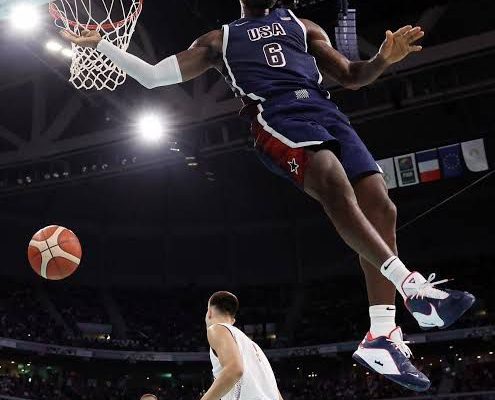One year ago today, Team USA tipped off what would become another defining Olympic journey by taking on Serbia in a matchup that blended rich basketball tradition with a potent display of modern dominance. The scoreline—110 to 84—spoke to an overwhelming American statement, but the subtext lay in the return of a legend and a performance that reminded the world why the red, white, and blue remain the bar in international basketball. On that day, LeBron James, already an icon with decades of dominance in both the NBA and on the global stage, delivered a game that was less about box score bragging rights and more about orchestration, leadership, and subtle but powerful dominance.
LeBron finished the contest with 21 points, 7 rebounds, and 9 assists on an ultra-efficient 9-of-13 from the field. But beyond the numbers, it was the way he played—the pace he controlled, the defensive attention he demanded, and the space he created for his teammates—that set the tone for Team USA’s entire Olympic campaign. This wasn’t merely a great player showing up for an opening-round Olympic game. This was LeBron signaling, in unmistakable fashion, that gold was not just a goal, but an expectation.
The matchup itself was seen as one of the marquee early-round showdowns. Serbia, anchored by NBA MVP Nikola Jokić and bolstered by a seasoned roster of international stars, had arrived in Paris with their eyes set on challenging the American dynasty. Many viewed the game as a potential early trap for Team USA, particularly given the cohesion and chemistry of the Serbian side. They played together with fluidity, executed precise half-court sets, and had the kind of big-game experience that could have made them dangerous. But from the opening tip, it became clear that Team USA had not come to merely participate—they had come to dominate.
Much of that domination stemmed from LeBron’s orchestration. Early in the game, he set the tone by attacking mismatches with ruthless precision. Whether facing off against smaller defenders or dragging Jokić out into space, LeBron was surgical. His scoring came in bursts—an early transition dunk that brought the crowd to its feet, a baseline turnaround jumper over a double-team, and a signature left-handed drive through contact that prompted even Serbian fans to nod in appreciation. But more than the scoring, his court vision carved up Serbia’s defense. Several of his nine assists came off pinpoint passes that split defenders, finding shooters like Devin Booker and Anthony Edwards in rhythm from deep.
Serbia, for their part, tried to answer back with Jokić facilitating from the top of the key and trying to slow the game’s pace. They momentarily found some traction in the second quarter, cutting the lead to single digits behind the hot shooting of Bogdan Bogdanović and a stretch of smart defensive rotations. But Team USA’s depth proved overwhelming. Even when LeBron rested, the likes of Jayson Tatum, Damian Lillard, and Jrue Holiday stepped in with relentless pressure. The American defense turned up the intensity, forcing turnovers and converting them into easy fast-break points. That second-quarter surge buried any hope of a Serbian comeback.
By halftime, the U.S. led by 18. LeBron had already notched 13 points and six assists, and his fingerprints were all over the game. In the third quarter, he returned with even more control, not forcing the issue but always making the right play. He found Bam Adebayo on a perfectly-timed lob, assisted Tatum on a corner three, and delivered a behind-the-back pass to Edwards on a fast break that brought the Parisian crowd to their feet. The chemistry was undeniable, and the rhythm unstoppable.
Beyond the numbers, LeBron’s leadership shined. During dead balls and timeouts, cameras often caught him in animated conversations with teammates—coaching, encouraging, directing. Younger players like Anthony Edwards and Tyrese Haliburton later credited LeBron’s presence as a calming force, one that brought gravitas and urgency to the Olympic environment. It wasn’t just that LeBron played well—it was that his presence elevated everyone else. His basketball IQ remains unmatched, and on this stage, it showed.



